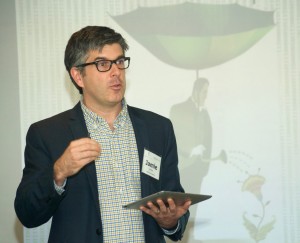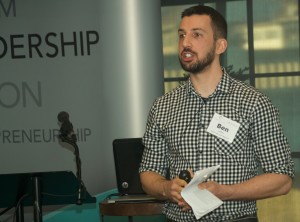It’s the kind of comment conference organizers love to hear as people pack up at the end. Some indication that theory will work its way into practice.
“We’re going to make it a line item in our budget,” Ron MacKinnon said about evaluation as Capacity’s first EvalU boot camp closed Wednesday (Nov. 25).
His fellow participants, some 40 leaders in the charitable not-for-profit sector, cheered.

Over the course of a day and a half, EvalU encouraged organizations to adopt evaluation as a learning culture instead of occasionally employing it as a measurement tool. Programs can turn out impressive numbers about clients served, but evaluation goes well beyond that to ask, “So what?”
With evaluation running smoothly, steadily generating fresh data, organizations have the sure-footedness they need to try new things. They can take informed risks. They can innovate and improve.
MacKinnon is the executive director of the Community Resource Centre of North and Centre Wellington. The centre, he said in an interview, refers to itself as a “community-benefit agency,” and lives up to the title by providing licensed child care, support for families in need and transportation for those of limited means who need to get to critical appointments.
That work produces data, lots of it. EvalU has MacKinnon thinking about how that information can be used more effectively.
“There really is a great need in my agency to build (evaluation) into what we do every day,” MacKinnon said. “I think that our staff, if approached on evaluation, would say it’s a one-time event.
“But really they’re doing it every day when they engage with clients. I want to work with them to collect great information about the valuable work they are doing.”
He plans to build time and resources into his budget to get evaluation working across the organization’s key services.
“I also think it will make staff feel better about the work they are doing — that it does contribute to making lives better,” MacKinnon said.

EvalU participants learned that evaluation doesn’t come in a tidy plug-and-play format. Organizational structure — whether the working culture is familial and collaborative or top-down and policy-driven — shapes the model, said evaluation expert Jamie Gamble of Imprint Consulting.
Evaluation thinking is also likely to encounter workplace resistance in some form bias, Gamble said. To overcome it, he suggested organizations throws some fun into the mix by:
• Putting evaluation through a mock debate to discuss pros and cons;
• Assigning somebody to play devil’s advocate and ask hard questions about how evaluation makes a difference;
• Running scenarios to see how evaluation would work in different situations;
• Designing prototypes. What might evaluation look like in an organization?

The conversation about evaluation between funders and organizations has to open up, said Ben Liadsky of the Ontario Nonprofit Network.
“A one-year project may not need the same number of evaluation tools as a five-year project,’’ he said. “And people need to be able to say something doesn’t work without worrying that their funding will disappear.”
Capacity Canada’s EvalU project, supported by the Ontario Ministry of Citizenship, Immigration and International Trade, heads to Kingston, Jan.26-27.

